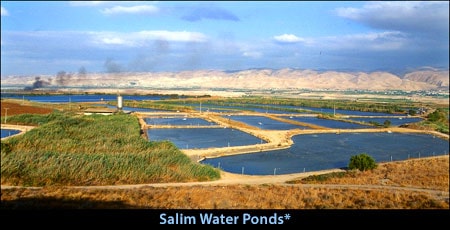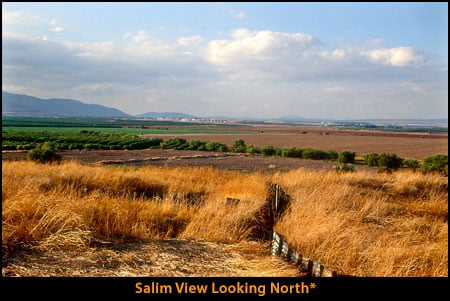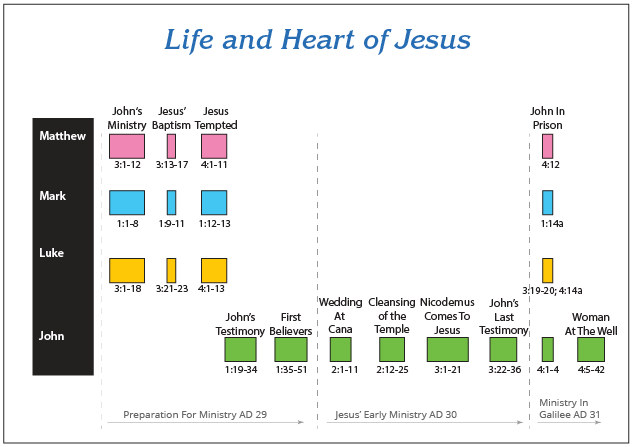Success in most nations, governments, social groups, businesses, and churches in the world today is measured by how much income is received and/or by how many people attend. Most of us are impressed with large companies that have huge annual profits or have tens of thousands of employees. Some of us would like to own that mansion we saw last week while driving in the city or country. Some of us are jealous of wealthy people. We admire the Bill Gates of the world and some would like to live in his home. In short, money and numbers are measures of success. This is true not just in the world but unfortunately also in our churches. Churches boast about how much money they give to missions, and pastors are frequently asked about the size of their church or the size of their annual budget. But this is not new. It has always been this way as we will see in our study; but God has a different measure of success and it is not numbers!
In Salim
Our study begins with John 3:22-23.
After these things Jesus and His disciples came into the land of Judea, and there He was spending time with them and baptizing. John also was baptizing in Aenon near Salim, because there was much water there; and people were coming and were being baptized — for John had not yet been thrown into prison. John 3:22-24 (NASB)

The first thing that we are told is that Jesus and His disciples were down in Judea baptizing. The Greek language of John 4:1-2 tells us that Jesus did some baptizing, but His disciples were doing most of it. Jesus did very little. He was a great example of a servant leader who shared the ministry with others. Some leaders want to do everything.
We also discover in these first opening verses that John the Baptist was in Aenon near Salim which means “springs.” The geography of Aenon and Salim was probably very similar since they were near the Jordan River where there was lots of water. There are three modes of baptism that are practiced today by Christians: sprinkling, pouring, and immersion. Which one do you think requires “much water”? Why did John want “much water”? Since “much water” is not required for sprinkling or pouring, it appears that John the Baptist was baptizing or immersing people. That is, he dipped people below the surface of the water. Both John and Jesus were baptizing people. That is the message. Both of them were drawing crowds of people. Both of them were popular, but more people were coming to see Jesus.

Trouble Has Come
Jesus and John were like two young men in the ministry. John the Baptist was the forerunner of Jesus and had consequently started in ministry first. Jesus came along later and was, in fact, introduced to the crowds of people by John. There is a sense in which John “helped Jesus get started” like that of an older and younger preacher, except that these men were about the same age, John was the forerunner, and Jesus was God in human flesh, who is the Jewish Messiah.
Therefore there arose a discussion on the part of John’s disciples with a Jew about purification. And they came to John and said to him, “Rabbi, He who was with you beyond the Jordan, to whom you have testified, behold, He is baptizing and all are coming to Him.” John 3:25-26 (NASB)
Jesus and John supported each other and ministered together even though they were in different locations. But the followers of John did not understand their leader’s role. So trouble eventually came when a Jew started a discussion with some of John’s disciples about purification.
We do not know anything about this Jew, except that he had a discussion with them about purification. The Jew could have started the conversation with questions about their method of baptism, or by asking why they were baptizing. But at some point comments were made about the fact that Jesus was also baptizing, and the Jew must have reported that Jesus was baptizing more people than John. Little words, just little words can cause so much trouble – “Jesus is baptizing more.”
In response, John’s disciples became upset and went to John and complained. Here we are told that they called John “Rabbi.” This is the same word that was used for Jesus. Both Jesus and John were rabbis. They were considered to be spiritual leaders and teachers.
Taking Credit For Success
Can you hear John’s disciples complain, “All are coming to Him!” “Everyone is coming to Jesus!” It is obvious that “everyone” was not coming to Jesus. “All” were not coming. The whole countryside was not coming. They were exaggerating. Their choice of words gives away their emotions and frustration. Their words reveal the jealousy in their hearts. Their words reveal that their measure of success was “how many are coming” and Jesus was having “greater success.” Their concept of success was wrong. The same is true today among some pastors and church leaders. They count every person who attends the various events at the church. Bible Studies and ministries are cancelled because there are not enough people coming. We do not ask the question, “Is spiritual growth occurring?” because numbers are our measure of God at work.

It is also common for pastors and leaders in a church to be honored for having increased the size of the church or for having accomplished a list of other wonderful things. These are nice words. They are flattering words, and maybe he or she has accomplished a lot; but such praise dishonors the Lord and puts the focus on man. It is God who deserves the honor and praise when great things are accomplished because it is He who gives the increase. When men take the credit, they deny God the glory, because men only plant and water. They do not cause the increase. The Apostle Paul reminds us of this spiritual truth when he says,
For when one says, “I am of Paul,” and another, “I am of Apollos,” are you not mere men? What then is Apollos? And what is Paul? Servants through whom you believed, even as the Lord gave opportunity to each one. I planted, Apollos watered, but God was causing the growth. So then neither the one who plants nor the one who waters is anything, but God who causes the growth. 1 Corinthians 3:4-7 (NASB)
Some have forgotten that it is not our talent, it is not our skill, it is not our intelligence, and it is not our charisma that brings spiritual blessing and growth. It is the Lord Himself who “brings success.” It is the Holy Spirit who is at work in the hearts and minds of men and women. We are only His tools.
When John the Baptist heard the complaint of his disciples that more people were coming to Jesus, He recognized their error and responded in a way similar to Paul in 1 Corinthians 3:4-7.
John answered and said, “A man can receive nothing unless it has been given him from heaven. John 3:27 (NASB)
John said it right. The disciples were wrong. The “How big are we?” was the wrong measure of success. It is the world’s measure of success.
Someone once said that any preacher can build a large church of 1,000 or more people. But that is not true. The comment ignores the work or sovereignty of God and assumes that man is in control. It ignores the fact that God might allow him to grow a church that dishonors Him. This happens frequently in churches around the world. Just consider the seven churches of Revelation. Five of the churches received rebuke and only two were good. God allowed five bad churches to exist. How many people attend a concert or go to a basketball game is not a measure of spiritual success or God’s blessing. Numbers alone do not indicate if God is at work in a church, Bible Study, Sunday School, or ministry. Numbers only indicate how many people were attending. God even allows false religions to grow. Many false religions have great numbers of people attending, but they are not receiving God’s blessing. God is not in their midst. Numbers are not God’s measure of success.
The Measure of Success
So what is God’s measure of success? John revealed the answer to his disciples when he said the following,
You yourselves are my witnesses that I said, “I am not the Christ,” but, “I have been sent ahead of Him.”John 3:28 (NASB)
The Greek language is wonderful here because it tells us that John strongly emphasized the “not” and emphasized his “I” in the statement above. The literal Greek reads something like this, “I, I am NOT the Christ.” John emphatically tells them that he has a different calling from God. He knew what God had not called him to do. John understood that God wanted him to be the forerunner of the Messiah (Hebrew word for the Greek word Christ). John understood that God had not called him to be the Christ. It was not in God’s plan for John the Baptist to have greater numbers or more people in his ministry than Jesus. God called John to minister, and John was content to submit to God and to be faithful in his ministry. In fact, it was God’s plan for John to soon be imprisoned.

Now that is a humble man. What is humility? According to 1 and 2 Peter, humility is evidenced by submission to another, and John was a wonderful example of humility toward God. He did not care if Jesus had greater numbers. John 3:30 and John 4:1 tell us that Jesus was drawing more people than John, and this would suggest that the number of people who were following John was dropping. Some of John’s followers most likely left John and started following Jesus. Ouch! It was in God’s plan for John’s numbers to drop. If we peek behind the words of verse 30, we find that John was decreasing in popularity. His numbers were dropping because John was pointing people to Jesus. It was God’s plan for his numbers to drop, but it does not mean that God’s blessing had been removed from John. Yet, Christians today will cancel Bible Studies, drop Sunday School classes, and change what they are doing in order to increase the numbers. The message is simple, God has not called us to have large churches or large “anything else.” He has simply called us to be faithful to Himself and to faithfully plant and water. The Apostle Paul said it well,

I have fought the good fight, I have finished the course, I have kept the faith; in the future there is laid up for me the crown of righteousness, which the Lord, the righteous Judge, will award to me on that day . . . 2 Timothy 4:7-8 (NASB)
Paul’s measure of success was faithful service to his Lord. He did what God called him to do, just like John.
He Must Increase
Then John gave his disciples a parable about the friend of a bridegroom who was happy that the bridegroom was happy.
He who has the bride is the bridegroom; but the friend of the bridegroom, who stands and hears him, rejoices greatly because of the bridegroom’s voice. So this joy of mine has been made full. John 3:29 (NASB)
At first the parable seems odd. How does it fit into the complaints of his disciples? Why did John say this? The answer is that, rather than complain about what God was doing, John was rejoicing because it was in God’s plan for Jesus to increase. Just as a wedding has a purpose and a plan, so God has plans to accomplish His purpose. Jesus taught His disciples to pray, “. . .
Your kingdom come. Your will be done, on earth as it is in heaven. Matthew 6:10 (NASB)
God’s will was being done on earth. Jesus was supposed to increase and John was supposed to decrease. So John said,
He must increase, but I must decrease. John 3:30 (NASB)
Jesus was supposed to “become more famous.” The forerunner, the one who introduced Jesus to the world was supposed to decrease. Some of us have our priorities wrong today. Some have forgotten that they were called to be faithful to teach the Word of God and let God give the increase whether large or small. The church growth movement approach is not biblical. Numbers are not the goal. The church is not the primary place where spiritual births are to occur. God primarily designed the church to spiritually grow Christians through in-depth teaching of the Word of God. The primary place where spiritual births are to occur is in our neighborhoods, at the job, and any other place where we meet people. We are the ones who should tell others about Jesus. That is the calling of the body of Christ – the church.
Who Is Jesus?
Why was John so positive about Jesus? Why was he glad that Jesus was increasing? The answer is found in his following comments.
He who comes from above is above all, he who is of the earth is from the earth and speaks of the earth. He who comes from heaven is above all. What He has seen and heard, of that He testifies; and no one receives His testimony. He who has received His testimony has set his seal to this, that God is true. For He whom God has sent speaks the words of God; for He gives the Spirit without measure. The Father loves the Son and has given all things into His hand. He who believes in the Son has eternal life; but he who does not obey the Son will not see life, but the wrath of God abides on him. John 3:31-36 (NASB)
These words make it clear that John understood a great deal about Jesus. He says Jesus came from “above,” “is above all,” He speaks the truth, the “Father loves” Him, and Jesus is the Lord and King of everything. John included every member of the trinity: God the Father, God the Son, and God the Holy Spirit. Wow, what a statement of truth!
Then John ends on both a positive and a negative note. He tells them that if they will believe in Jesus, they will have eternal life; but if they do not believe or do not depend on Him, they will end up in eternal wrath or punishment.

Conclusion
John’s message was simple. Jesus was greater than John. Jesus should increase and John must decrease. And so it is in this life. God raises men and women to do His work. Some will be greater than others. When we see that they are called of God and are doing His will, when their message is biblical, when their life is above reproach, when they give honor to God for what is occurring, when they are humble, and when they are seeking to be faithful to the calling of God on their lives, then we can rejoice when their ministry is increasing beyond ours.
It does not matter what type of ministry you have. You may be a pastor, church leader, a Bible teacher, a faithful servant in Women’s Ministry or Men’s Ministry, a counselor, involved in missions, or in some other ministry, but God only cares about one thing. He is watching to see if you are doing what He has called you to do. He has not called us to look over our shoulders to see what others are doing. He has not called us to compare our ministry to that of others. God only wants to know – just as John did – are you doing what He asked you to do?
Church leaders need to be less focused on numbers and more focused on the spiritual growth that is occurring in the lives of God’s people. Nowhere in scripture can we find God asking us to create large churches. God has called us to make disciples. The phrase “make many disciples” cannot be found in Matthew 28:19-20. God has called only us to faithfully plant and water. It is He who causes the increase or decrease. It is the work of the Holy Spirit.
God has not called us to grow anything. He has not called us to please the pastor, to serve the church leadership, or to be loyal to anyone in our church. He has only asked us to fix our eyes upon Him and to please Him! God’s measure of success is your faithfulness in doing what He asks you to do! That is all. There is no other priority. God is to be your all in all. He is your Lord. How are you doing?
Credit Line:
Suggested Links:
Forerunner John The Baptist Has ArrivedJohn the Baptist
John the Baptist’s Testimony
John the Baptist Has Doubts About Christ
Praise of John The Baptist